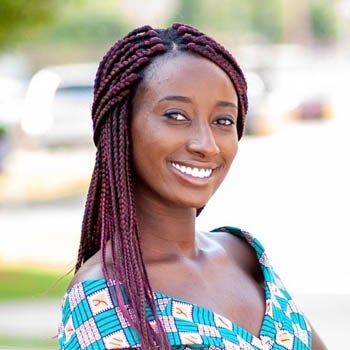Major: Kinesiology - Health Sciences concentration
Minor: African Studies
Research Advisor: Hoda Badr, Baylor College of Medicine
“During my time in high school, I became passionate about the health experiences of different populations. I realized that a public health degree would allow me to study health on a macro scale,” said junior Kinesiology major Astrid Sarfo. Initially, Astrid intended to propose a self-designed major, but then she realized that all of the courses she was interested in were offered through the Kinesiology department or listed as electives for the Kinesiology degree with a concentration in Health Sciences. “That’s when I realized that Rice did indeed have the major I was looking for, albeit under a different name and a little hidden,” she said.
In the Health Sciences concentration, students can take courses in the natural sciences, social sciences and humanities in order to tailor the degree to match their particular interests. “My favorite thing about my major is its interdisciplinary nature,” Astrid said. “I am not bound to one field when it comes to my coursework as well as opportunities that I seek out beyond the classroom.” This was particularly evident in her Medical Sociology course, where she explored the relationship between social factors and health and illness. “The course material allowed me to form connections between what I had learned in my public health classes and relate it to lived experiences. It challenged my notions of health disparities, medical education and perceptions of illness,” she said.
In addition to her coursework, Astrid has been working with Dr. Hoda Badr at Baylor College of Medicine in a research position focused on health psychology and health disparities. “Our research is focused on psychosocial intervention and supportive care planning for cancer patients and survivors across different cancer populations,” she explained. The research team conducts interviews with metastatic breast cancer patients and their caregivers to explore their supportive care needs and preferences. “We are particularly interested in common themes among the support preferences of minority and underserved dyads,” said Astrid. Ultimately, their findings will help create a program to provide cancer patients and their caregivers with the information, skills training and accommodations that they need.
Astrid finds the ability to connect directly with patients very rewarding. “I love listening to the stories of the patients and their families and hearing them emphasize the need for the research we are doing. It is encouraging to hear that patients find value in the knowledge we are seeking and the program we hope to create,” she said.
Outside of the lab, Astrid enjoys exploring everything Houston has to offer. “I am from a very small town in Northeast Ohio — as in, we have equal numbers of cows and people level of small,” she said. “Coming to Houston has been great because I have met so many different people from all over the world. It is engaging to walk outside and hear different languages, smell different foods and learn about the experiences of others.”
The diversity she has found in Houston has enabled her to connect with groups that share her passion for her faith and culture. She is the director of her local church’s youth group, is involved with Christian ministry on campus, and she stays connected to her Ghanaian heritage through the Rice African Student Association, where she served as co-treasurer.
She has some parting advice for anyone considering coming to Rice. “The experiences you will receive at Rice will be unparalleled should you choose to embrace them and immerse yourself in them. I have been challenged, and I have been pushed, but I have grown tremendously as a result,” said Astrid. Her Rice experience will continue to influence her path after graduation, where she plans to spend a gap year gaining clinical experience before applying to medical school.

